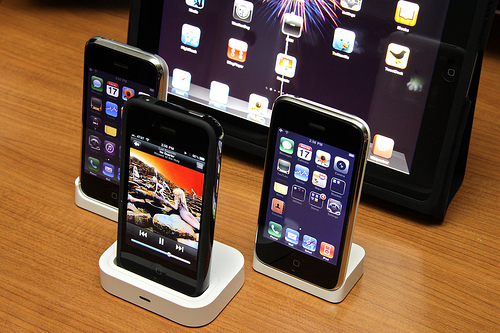DiData kicks off BYO device trial

Dimension Data chief information officer (CIO) Ian Jansen today revealed that the IT services company is in the preliminary stages of a bring-your-own (BYO) device trial that will see staff offered a choice between the traditional company desktop computer or their own consumer laptop or tablet devices.

Devices like iPads and iPhones will soon be officially allowed into Dimension Data's business. (iPhone 4 Bumper + Universal Dock w/ DIY Adapter image by Yutaka Tsutano, CC BY 2.0)
In an interview with ZDNet Australia today, Jansen said that the company has decided to hold the trial because of the proliferation of consumer devices being brought into the office.
"We don't know what the flavour of the month will be in six months' time. If someone had told me three years ago that iPhones would overtake BlackBerry and Nokia, I would have put a small wager against that. Not a day goes by without a new device being announced," he said.
The trial base currently stands at around 40 staff using devices including iPads, Apple laptops and even Android tablets.
"We think the pilot will run for a few months, and it extends from Apple Macs ... to iPads, because every second person has one in our business, and iPhones. Somebody this morning requested an Android device for the pilot, also.
"I'm absolutely confident it will be done by year end," Jansen said.
According to Jansen, the days of controlling the devices coming in and out of a business are long gone, and it's now up to IT managers to strengthen its infrastructure accordingly.
"We've got a part to play in facilitating this change. That's from policy to practical aspects, like being able to wipe [a device] when it's lost. We've got a very robust program in place to work to get [those policies] that place," he said.
"The trick is, rather than concentrating on the end-devices, we need to make sure our architecture and the framework is substantial, solid and well worked through."
Virtualisation is the key to protecting mission critical business data, according to Jansen.
"We're just doing our pilot at the moment, and we can push a virtual desktop to a device, so we can contain the environment we push to somebody's Mac, for example. The next person who walks into the office with an iPad should be able to do the same thing," he said.
"People want their devices in our business, but it's about a delicate balance of providing a secure environment but having enough flexibility to work on a device of [a user's] choice."
DiData's trial of BYO devices is similar to that of Queensland-based banking giant Suncorp, which implemented a virtualised infrastructure using Citrix and open-source tools that staff can access securely without data leaking out of the business onto the personal device.
Not every corporate firm is so passionate about BYO device models, however; Australia Post CIO Wayne Saunders said that allowing BYO devices in the enterprise was like "waking a sleeping dragon", while the CIO of Crown Group, Ric Lamb, added that the risk of data leakage keeps him up at night.
The higher education sector is leading the way with BYO device models, with Curtin University CIO Peter Nikoletatos wondering aloud to ZDNet Australia in April why some enterprise IT managers struggle with the concept.
"There's been a huge take up of [BYO devices] across the university. Why would [BYO device management] be different for 5000 staff from 48,000 students? It's not," he said at the time.